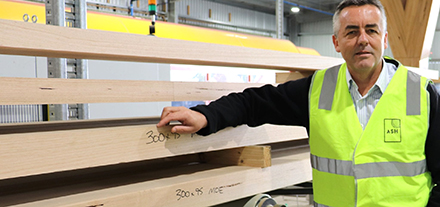Victoria’s Premier Dan Andrews must accept 100% of the blame for up to 200 job losses at Maryvale Mill, after Opal Australia decided to cease manufacturing white pulp and paper, according to the Federal Member for Gippsland Darren Chester. Source: Timberbiz
Mr Chester has told Federal Parliament that the Victorian Government’s plan to abolish the native timber industry in Victoria was already impacting local jobs.
“People and wildlife die in poorly managed forests, and Victorian Premier Dan Andrews’s plan to shut down the native timber industry is a plan to kill country towns, to kill wildlife and to kill Australian jobs,” Mr Chester told Parliament.
“The combined impact of judicial activism, environmental protests, green lawfare and the abject failure of the Victorian Labor government to support our world-class and environmentally sustainable timber industry is devastating regional communities across Gippsland.
“Every worker who loses their job, every family facing financial stress, and the difficult decision to leave the community they love, has just one man to blame, and that man is Premier Dan Andrews and a Labor Party in Victoria that doesn’t care about blue-collar workers anymore.”
Mr Chester said he had raised concerns about fibre supply to the mill two years ago in a letter to senior management.
“I raised my concerns then because I wanted to seek answers on behalf of hundreds of workers whose jobs are threatened by cuts to timber supply,” Mr Chester said.
“I don’t trust the Premier and I didn’t believe State Government assurances that jobs would be secure in the proposed transition to plantation timber. The State Government’s policy to abandon all harvesting of native timber is a direct threat to jobs at the paper mill along with all other timber industry jobs in our region.
“These latest job losses were completely avoidable if Melbourne Labor Ministers had taken action to protect the hardwood timber industry from activists and secure the fibre supply over the longer term.”
Mr Chester said the decision to cease manufacturing white pulp and paper was devastating for workers at the mill and sub-contractors who provide transport and logistical support to the industry.
“The job losses don’t finish at the mill gate, there will be truck drivers and other sub-contractors in our region who will lose incomes as a result of this decision,” Mr Chester said.
“What is the Premier going to do for those family business owners? What is the Prime Minister going to do about Australia losing the capacity to manufacture white copy paper on our own shores?
“Despite the apathy and hostility of the Labor Party to local timber workers, I remain committed to working with industry and community leaders to save jobs in this environmentally sustainable and economically critical Gippsland industry.
“If the industry is shutdown, we will see less practical management of the fire risk in the bush with lives and livelihoods put at risk, all for the sake of Premier Dan Andrews chasing Greens votes in the city.
“We need to produce more of our own critical supplies as a nation and shutting down the native hardwood timber industry in Victoria is already leaving us exposed to fluctuations in foreign markets, and timber harvested from less environmentally sustainable sources.
“Victoria is home to a world-class, environmentally sustainable, and highly regulated native hardwood timber industry which is innovative, and has invested in technology to maximise yield and reduce environmental impacts.”
Australian Forest Contractors Association general manager Carlie Porteous said the decision had been made despite industry, unions and workers providing solid solutions to the State Government.
“This is a disastrous outcome for the communities of Gippsland that provide services to the mill including multi-generational forest contracting businesses,” she said.
“It’s devastating that the decision has been made.
“Not only will this add further cost of living pressures, it is another example of the Victorian government failing regional workers, especially in Gippsland.”
Redundancies at the Opal Maryvale mill have been widely reported since January, when the last rumoured reel of Reflex Paper was produced.
“The job losses at the mill, as well as the flow on effects to Australian manufacturing and national sovereignty cannot be dismissed,” Ms Porteous said.
“We have a federal government trying to rebuild, better after covid, and state governments failing these businesses, workers and regions through lack of action.
“Despite the closure of the white paper facility, AFCA is encouraged by the fact that there are numerous Australian manufacturers that will use the sustainably harvested hardwood resource for high value products. Not only will Australians be able to purchase high value visual grade timber products, they will also be supporting Australian manufacturing jobs.
“We will continue to encourage the Andrew’s Labor Government to re-commit to the VFP and engage with industry on a better outcome for our regions,” Ms Porteous said.
CEO of the Australian Forest Products Association Joel Fitzgibbon and CEO of the Victorian Forest Products Association Deb Kerr said Opal’s decision marked a sad day for Australian manufacturing and our sustainable native forest industries.
“We will continue to remind decision-makers about the importance and sustainability of Australian native forestry. My thoughts are with the company and its employees today. It’s a sad day,” Mr Fitzgibbon said.
“AFPA and VFPA will continue to educate political leaders, other decision makers and the broader community about the fact that native forestry is sustainable and necessary to create a multitude of different everyday products including floorboards, furniture, structural timbers for housing and paper,” he said.
Ms Kerr said the reality now was that all of Australia’s white paper will be imported.
“The risk now is many of the things we use on a daily basis that require native timber or fibre could be produced in countries with less robust environmental standards,” she said.






